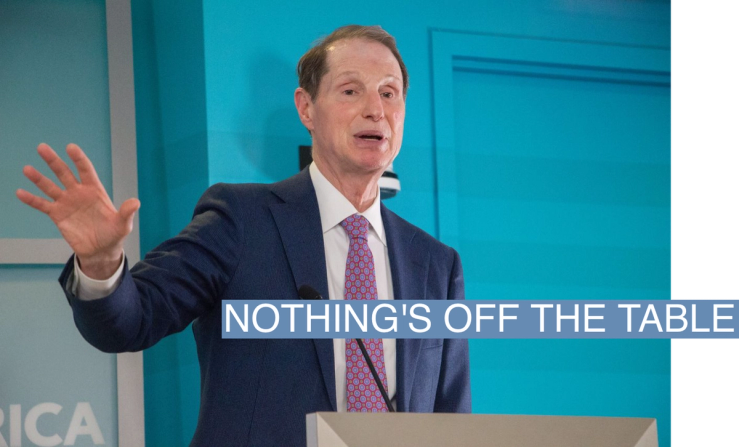
Few Democrats were more influential in building and passing President Joe Biden’s agenda than Sen. Ron Wyden, D-Ore., whose Finance Committee shepherded the Inflation Reduction Act into law. Shortly after casting his first vote of the lame duck session on Monday, Wyden talked to Semafor about why Democrats won big in the November midterms and where they might go next with Republicans likely taking over in the House.
Joseph Zeballos-Roig: Democrats ran in a tough political environment due to high inflation. But the party still held on to the Senate and fended off a red wave in the House. What’s the takeaway from this election season?
Senator Ron Wyden: I think the takeaway is that voters are savvy about who is actually focused on stuff that helps them and who is just kind of going through the motions.
On prescription drugs, from the beginning, we had a focus on getting real results. We tried to be bipartisan, as we did in the Finance committee with the bill I had with Senator Grassley. But when they wouldn’t use common sense negotiation, we went off and put in place policies that really helped people.
Joseph Zeballos-Roig: So you have a 50 vote Democratic Senate that could grow one more seat. You have what looks like either a tiny Republican House majority, or an even tinier Democratic majority in the House. You have constraints from inflation. Is there anything you guys can pass on the economy?
Ron Wyden: I would hope that on issues like housing supply and childcare supply, that with the strong support I believe we’ll have from the business community, some Republicans would be interested. We had a hearing in the Finance Committee on the housing issue right before the break and we had good attendance from Republicans. You won’t hear very many Democrats use the word supply-side, I use it: Supply-side is necessary for housing and childcare.
Joseph Zeballos-Roig: The popular narrative heading into the midterms about the Democratic agenda was that you turbocharged the economy with a $1.9 trillion stimulus and ended up with a low unemployment, high inflation economy that voters hated. But in the end, they didn’t really seem to punish Democrats for it much. Do you see the midterm results as a vindication of the American Rescue Plan?
Ron Wyden: To me, the Rescue Plan made sense in a variety of areas. We focused on trying to make sure that we were dealing with the job market, because we had real economic problems right then.
The jobs market has been incredibly strong in the past two years. And to tell you the truth, one of the lessons I think you’ll learn from the rescue plan is we’re going to have to go big in some crucial areas: Housing supply would be one, child care would be second. We’re going to have to go big — and in some respects, there was a risk of going too small, and that was learned in 2010 as well.
Joseph Zeballos-Roig: Sam Bankman-Fried has been in the news for the epic collapse of his crypto exchange firm FTX (Note: Bankman-Fried is an investor in Semafor). This seems a lot like the kind of crashes that we saw in 2008 that led to major reforms on Wall Street. Does this change any of your views about crypto regulation? What does it mean for its future?
Ron Wyden: I’ve been working for some time on some consumer protection efforts that I hope we’ll be able to have ready to talk about here before too long.
What I’ve been most interested in is innovation, and particularly the blockchain, I’ve always thought had a lot of potential for getting around some of the big bureaucracies and the way they just keep on coasting because there’s not anybody challenging them.
So I have a big interest, and I had it before everybody saw this stuff in the last two weeks, in beefing up consumer protection. And my focus, Joe, has always been on innovation. You can set your clock by it. In this space, that’s what I’m looking for.
Joseph Zeballos-Roig: Does the debt ceiling get harder to address next year if House Republicans only win a narrow majority? Should reconciliation be on the table if Democrats don’t find 10 Republicans willing to lend bipartisan support and the lame duck?
Ron Wyden: I think that this is an issue where the far right, these conservative Republicans are looking for ideological trophies. That’s what’s behind their proposal, for example, to sunset Medicare and Social Security programs. They’re looking for ideological trophies. As Chairman of the Finance Committee, that’s not going to happen on my watch. These programs are a guarantee. I think you’ll see a lot of Democrats say here in the next few days nothing’s off the table in terms of what we’re gonna look at.
Joseph Zeballos-Roig: Do you have any thoughts on Senator Manchin’s call a couple of weeks ago for a broad bipartisan deal on Social Security and Medicare in a divided Congress?
Ron Wyden: You have to make sure that there are some kind of bedrock principles. For me, Social Security and Medicare are a guarantee. They’re not about something that can be privatized or voucherized, or any of these kinds of things. So that’s kind of my litmus test and it’s been that way for a long time and I think that’s sort of a difference between the two political parties.
